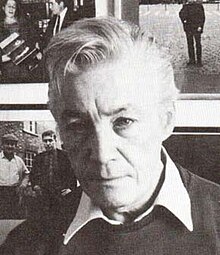Jeffrey Bernard

Jeffrey Bernard /bərˈnɑːrd/[1] (27 May 1932 – 4 September 1997) was a British journalist, best known for his weekly column "Low Life" in The Spectator magazine, and also notorious for a feckless and chaotic career and life of alcohol abuse. He became associated with the louche and bohemian atmosphere that existed in London's Soho district. He was later immortalised in the comical play Jeffrey Bernard Is Unwell by Keith Waterhouse.
Life
Bernard was born in London, and was one of three sons of the English architect Oliver Percy Bernard and his opera singer wife Dora Hodges. His siblings were the poet Oliver Bernard, and the art critic Bruce Bernard.[2] Though named Jerry by his parents, at an early age he adopted Jeffrey.
He attended Pangbourne College for two years before his parents responded to the college's protest that he was "psychologically unsuitable for public school life".[3] Bernard was a third cousin to the actor Stanley Holloway[4] by way of his father, who was Holloway's second cousin. Because of this lineage, Bernard was distantly related to the actor Julian Holloway and the author Sophie Dahl, the respective son and granddaughter of Holloway.[5]
Even while at school, Bernard had begun to explore Soho and Fitzrovia with his brother Bruce. Seduced by the area's lurid glamour, he moved there at 16, supporting himself in a variety of jobs that were at odds with his middle-class background, including boxer, building labourer, kitchen assistant and coal miner, but still managed to build a circle that embraced Dylan Thomas, Francis Bacon, John Minton, Nina Hamnett, Daniel Farson and the lowlife of bohemian London.
In his youth Bernard was considered extremely good-looking and supplemented his earnings with gifts and loans from wealthy older women. Some acquaintances suggested he did the same with older men but Bernard always vehemently denied this. Elizabeth Smart suggested that he try journalism and he started to write about his interest in horseracing in Queen magazine.[3]
Bernard wrote a weekly column for the Sporting Life but was sacked in October 1971. This precipitated a disastrous period in his life. His 3rd wife left with their 2-year-old daughter and he was hospitalised in a detox clinic where he was forced to attend AA sessions. He afterwards always wrote scathingly about AA. After being told by a doctor that he would die very shortly if he continued drinking, he stopped and was "dry" for almost 2 years. During this period he worked as a barman. He was afterwards to describe this as the worst period of his life and resumed drinking on the grounds that life, if it required sobriety, wasn't worth having. He changed from whisky to vodka to lessen the effects of hangovers. Bernard continued to submit writing to various papers. He became Racing Correspondent for satirical magazine Private Eye, and even had work accepted by ex-employer Sporting Life.[6] He was given a column in The Spectator in 1975.[7] His column, entitled "Low Life" was contrasted with the "High Life" column by wealthy socialite Taki Theodoracopulos, writing as "Taki". While Taki's column described a life of yachts, casinos, and grand hotels, Bernard's was described by Jonathan Meades as a "suicide note in weekly instalments" and principally chronicled his daily round of intoxication and dissipation in the Coach and Horses public house and its fateful consequences. This was mixed with anecdotes, many of which were repeated in the play "Jeffrey Bernard is unwell", and ponderings on life.[8] His lifestyle had an inevitable effect on his health and reliability, and the magazine often had to post the notice "Jeffrey Bernard is unwell" in place of his column.[3]
Though married four times (Anna Grice in 1952, Jackie Heard, Jill Wilsworth and Sue Gluck), he often remarked, only half in jest, that alcohol was the other woman. Over time his drinking affected his health more seriously; he was hospitalised for detoxification, he suffered from pancreatitis and then diabetes. His right leg was amputated, three years before his death.[9] He died at his home in Soho at age 65 of renal failure after refusing further treatment by dialysis.[3]
References
- ^ "Mind Your Language: Dot Wordsworth continues her look at BBC booklets on pronunciation published in the 1930s"
- ^ Adrian Searle Obituary: Bruce Bernard, 31 March 2000
- ^ a b c d Waterhouse (2004)
- ^ "He was the nice one: farewell to Oliver Bernard", London Evening Standard, 4 June 2013
- ^ Holloway and Richards, pp. 74–75.
- ^ "Last orders for Jeffrey Bernard". The Daily Telegraph. 13 September 1997.
- ^ Howse, Christopher (6 September 1997). "Obituary: Jeffrey Bernard". The Independent. Retrieved 9 August 2013.
- ^ Bernard (1996) is a collection of his Low Life pieces from the Spectator.
- ^ http://www.thefreelibrary.com/JEFFREY+BERNARD+DIES+AT+65.-a061068191
Bibliography
- Obituaries:
- The Scotsman, 6 September 1997
- The Independent, 6 September 1997
- The Times, 8 September 1997
- Daily Telegraph, 8 September 1997
- Bernard, J., with an introduction by Peter O'Toole (1996). Reach for the Ground: The Downhill Struggle of Jeffrey Bernard. London: Duckworth. ISBN 0-7156-3150-0.
{{cite book}}: CS1 maint: multiple names: authors list (link) - Bernard, O. (1992). Getting Over It: Recollections. London: Peter Owen. ISBN 0-7206-0865-1.
- Lord, G. (1993). Just the One: The Wives and Times of Jeffrey Bernard 1932-1997 (New ed.). London: Headline Book Publishing. ISBN 0-7472-6004-4.
- Holloway, Stanley; Richards, Dick (1967). Wiv a little bit o' luck: The life story of Stanley Holloway. London: Frewin. OCLC 3647363.
- Waterhouse, K. (2004) "Bernard, Jeffrey Joseph (1932–1997)", Oxford Dictionary of National Biography, Oxford University Press, accessed 22 August 2007 (subscription or UK public library membership required)
